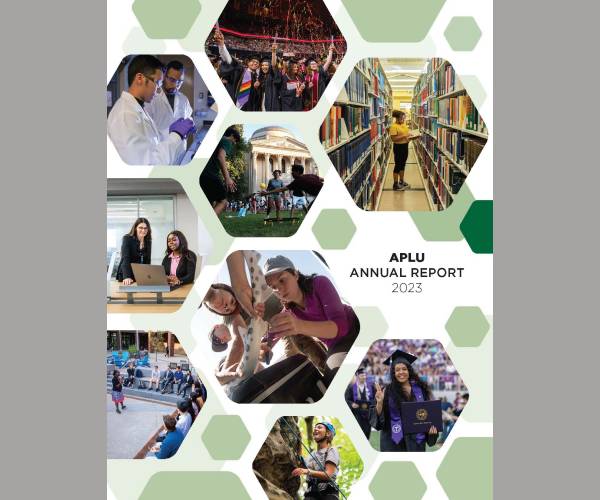APLU is a membership organization that fosters a community of university leaders collectively working to advance the mission of public research universities. The association’s membership consists of nearly 250 public research universities, land-grant institutions, state university systems, and affiliated organizations spanning across all 50 states, the District of Columbia, six U.S. territories, Canada, and Mexico.
The association and its members collectively focus on: increasing access, equity, completion, and workforce readiness; promoting pathbreaking scientific research; and bolstering economic and community engagement. Drawing on the powerful collective action of its members, APLU’s advocacy arm helps shape federal policy that maximizes the positive impact of public and land-grant universities.
APLU Vision, Mission, & Core Values
APLU undertakes a wide array of projects and initiatives along with its members and provides a forum for public higher education leaders to work collaboratively and better meet the challenges and opportunities facing public universities. Rallying the talents, knowledge and expertise among its member institutions is critical to the association’s mission. The APLU council structure enables university leaders with comparable titles, working in similar positions, to come together to address critical issues and expand their knowledge base within their professional area of expertise. The association’s commission structure enables individuals, regardless of position and from multiple disciplines across the universities, to come together to address critical issues and expand their knowledge base in areas of common interest regardless of position.
Founded in 1887, APLU is North America’s oldest higher education association with member institutions in Canada, Mexico, and the United States. In 1963, the American Association of Land-Grant Colleges and Universities merged with the National Association of State Universities to form the National Association of State Universities and Land-Grant Colleges (NASULGC). On March 30, 2009, the association adopted the name, Association of Public and Land-grant Universities, or APLU. In 2014, APLU welcomed a select group of public universities from Canada and Mexico as its first international members.
APLU by the Numbers
- Annually, APLU member campuses enroll 5.3 million undergraduates and 1.4 million graduate students, award 1.4 million degrees, employ 1.3 million faculty and staff, and conduct $61 billion in university-based research.
- APLU’s membership includes 220 campuses (including all U.S. land-grant institutions); 25 university systems; and 3 affiliates.
- The association’s membership includes 23 historically black colleges and universities (HBCUs), of which 21 are land-grant institutions (19 under the 1890 Morrill Act, two under the 1862 Morrill Act). It also includes 36 Asian American and Native American Pacific Islander-Serving Institutions (AANAPISI) and 32 Hispanic-Serving Institutions (HSIs).
- There are nine members in Canada and five in Mexico.





Stay Connected
X (formerly Twitter)
Facebook
YouTube
LinkedIn
RSS